作文第一套:
For this part, you are allowed 30 mimites to write an essay based on the graph below. You should start your essay with a brief description of the graph and comment on China’s achievements in urbanization. You should write at least 150 words but no more than 200 words.
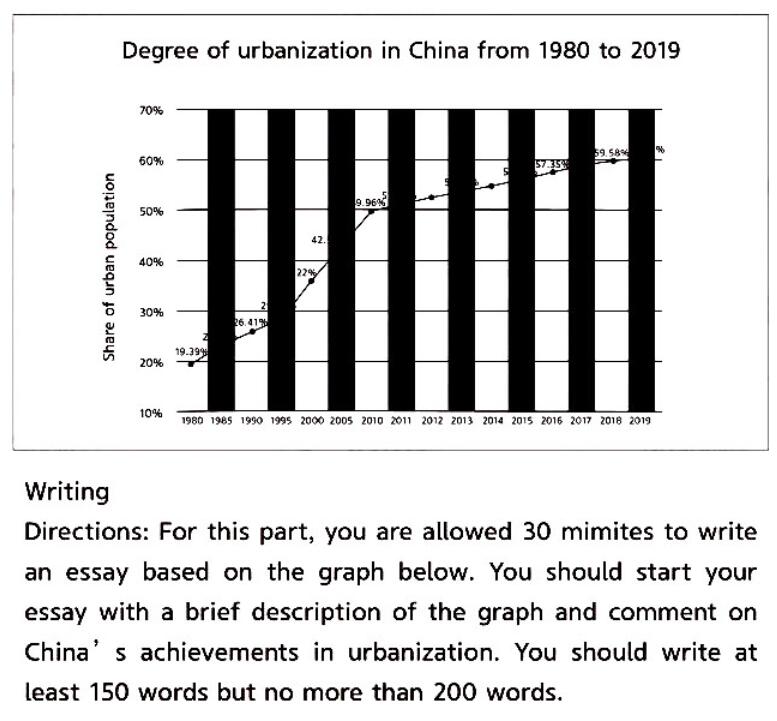
作文第二套:
Directions:
For this part, you are allowed 30 mimites to write an essay based on the chart below. You should start your essay with a brief description of the chart and comment on China’s achievements in poverty alleviation. You should write at least150 words but no more than 200 words.
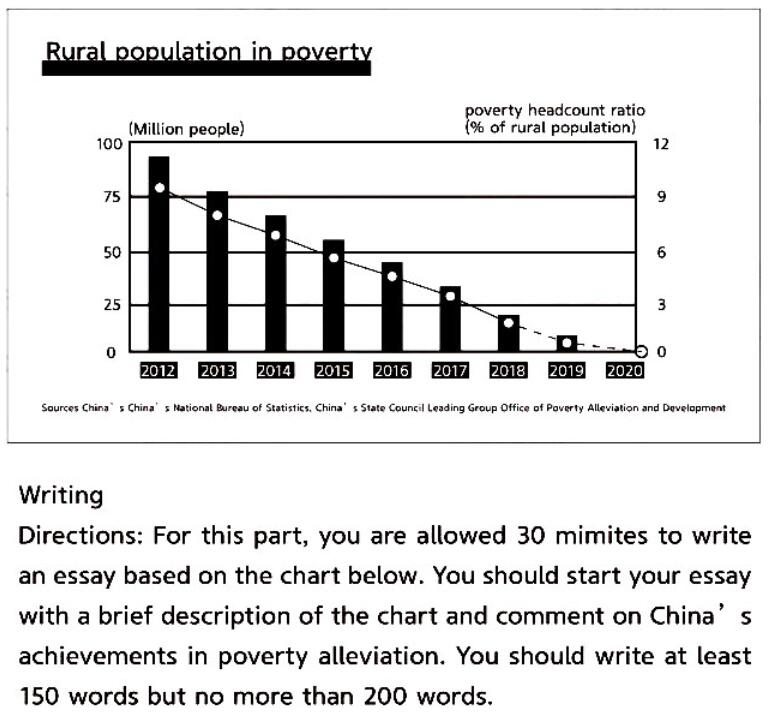
作文第三套:
Directions:
For this part, you are allowed 30 mimites to write an essay based on the chart below. You should start your essay with a brief description of the chart and comment on China’s achievements in higher education. You should write at least150 words but no more than 200 words.

听力第二套:
Conversation 1
话题:职场
Man: It's my last day at work tomorrow. I'll start my new job in 2 weeks. My human resources manager wants to conduct an interview with me before I leave[Q1].
Woman: Ah, an exit interview. Are you looking forward to it?
Man: I'm not sure how I feel about it. I resigned because I've been unhappy at that company for a long time, but I'm not sure if I should tell them how I really feel.
Woman: To my way of thinking, there are two main potential benefits that come from unleashing and agitated stream of truth during an exit interview. The first is release. Unburdening yourself of frustration, and perhaps even anger to someone who isn't a friend or close colleague can be wonderfully free.
Man: Let me guess. The second is that the criticism will, theoretically, help the organization I'm leaving to improve, making sure employees of the future are less likely to encounter what I did?
Woman: That's right. But the problem with the company improvement part is that very often it doesn't happen. An exit interview is supposed to be private, but often isn't. In my company, the information gained from these interviews is often not confidential. The information is used as dirt against another manager, or can be traded among senior managers[Q2].
Man: Now you've got me rethinking what I'll disclose in the interview. There is always a chance that it could affect my reputation and my ability to network in the industry[Q3]. It is a pretty small industry after all.
Woman: Anything you initially gained from the instant satisfaction of telling it like it is, you might lose down the track by injuring your future career prospects.
Man: Right. Perhaps I would be better getting things off my chest by going to one of those rate-your-employer websites[Q4].
Woman: You could. And don't do the interview at all[Q4]. Exit interviews are not mandatory.
Q1: What do we learn about the man from the conversation?
Q2: What does the woman think of the information gained from an exit interview?
Q3: Why does the man want to rethink what he will say in the coming exit interview?
Q4: What does the man think he had better do?
Conversation 2
Man: Today, I’m talking to the renowned botanist, Jane Foster.
Woman: Thank you for inviting me to join you on the show, Henry.
Man: Recently, Jane, you’ve become quite a celebrity, since the release of your latest documentary[Q5]. Can you tell us a little about it?
Woman: Well, it follows my expedition to study the vegetation indigenous to the rain forest in equatorial areas of southeast Asia.
Man: You certainly get to travel to some very exotic locations.
Woman: It was far from glamorous, to be honest. The area we visited was accessible only by canoe and the living conditions in the hut were primitive to say the least. There was no electricity. Our water supply was a nearby stream[Q6].
Man: How were the weather conditions while you were there?
Woman: The weather was not conducive to our work at all, since the humidity was almost unbearable. At midday, we stayed in the hut and did nothing. It was too humid to either work or sleep[Q6].
Man: How long did your team spend in the jungle?
Woman: Originally, we planned to be there for a month. But in the end, we stayed for only 2 weeks.
Man: Why did you cut the expedition short?
Woman: Halfway through the trip, we received news that a hurricane was approaching. We had to evacuate on very short notice[Q7].
Man: That sounds like a fascinating anecdote.
Woman: It was frightening. The fastest evacuation route was through river Rapids. We had to navigate them carrying all of our equipment.
Man: So overall was the journey unsuccessful[Q8]?
Woman: Absolutely not[Q8]. We gathered a massive amount of data about the local plant life.
Man: Why do you put up with such adverse conditions?
Woman: Botany is an obsession for me. Many of the destinations I visit have a stunning scenery. I get to meet a variety of people from all over the world.
Man: So where will your next destination be?
Woman: I haven't decided yet.
Man: Then we can leave it for another vacation. Thanks.
Q5: What does the man want Jane Foster to talk about?
Q6: Why does the woman describe her experience as far from glamorous?
Q7: Why did the woman and those who went with her end their trip halfway?
Q8: What does the woman think of the journey?
话题:科学文章中术语的使用不利于读者
Passage one
Scientists often use specialized jargon terms while communicating with laymen. Most of them don't realize the harmful effects of this practice. (9) In a new study, people exposed to jargon when reading about subjects like autonomous vehicles and surgical robots. Later said they were less interesting in science than others who read about the same topics, but without the use of specialized terms. They also felt less informed about science and less qualified to discuss science topics. It's noteworthy that it made no difference if the jargon terms were defined in the text. Even when the terms were defined, readers still felt the same lack of engagement as readers who read jargon that wasn't explained.
The problem is that the mere presence of jargon sends a discouraging message to readers. Hillary Schulman, the author of the study, asserts that specialized words are a signal. Jargon tells people that the message isn't for them. There's an even darker side to how people react to jargon. In another study, researchers found that reading scientific articles containing jargon led people to doubt the actual science. They found the opposite, when a text is easier to read. Then. People are more persuaded. (10) Thus, it's important to communicate clearly when talking about complex science subjects. This is especially true with issues related to public health, like the safety of new medications and the benefits of vaccines. Schulman concedes that the use of jargon is appropriate with scientific audiences. But scientists who want to communicate with the general public need to modify their language. They need to eliminate jargon. (11)
Questions nine to eleven are based on the passage you have just heard.
Question 9: What does the passage say about the use of jargon terms by experts? (开头)
Question 10: What do researchers find about people reading scientific articles containing jargon terms? (出现了in another study,跟研究相关)
Question 11: What does Schulman suggest scientists do when communicating with the general public?(答案出现在了转折词but之后)
Passage two
At the beginning of the twentieth century, on the Gulf coast in the US state of Texas, there was a hill where gas leakage was so noticeable that schoolboys would sometimes set the hill on fire.
Patio Higgins, a disreputable local businessman, became convinced that there was oil below the gassy hill. (12) Oil wells weren't drilled back then. They were essentially dug. The sand under the hill defeated several attempts by Higgins’ workers to make a proper hole. (13) Higgins had forecast oil at 1000 feet, a totally made-up figure. Higgins subsequently hired a mining engineer, captain Anthony Lucas. After encountering several setbacks, captain Lucas decided to use a drill, and his innovations created the modern oil drilling industry. In January 1901, at 1020 feet, almost precisely the depth predicted by Higgins Wild Gas, the well-roared and suddenly ejected mud and six tons of drilling pipe out of the ground, terrifying those present. (14) For the next nine days until the well was capped, the well poured out more oil than all the wells in America combined.
In those days, Texas was almost entirely rural, with no large cities and practically no industry. Cotton and beef were the foundation of the economy. Higgins’ well changed that. The boom made some prospectors millionaires, but the sudden surplus of petroleum was not entirely a blessing for Taxes. In the 1930s, prices crashed to the point that in some parts of the country, oil was cheaper than water. (15) That would become a familiar pattern of the boom or bust Texas economy.
Question 12: What did Texas businessmen Patio Higgins believe? (人名+观点)
Question 13: What prevented Higgins’ workers from digging a proper hole to get the oil?
Question 14: What does the passage say about Captain Lucas' drilling method?
Question 15: What do we learn about Texas's oil industry boom? (答案出现在but后面)
话题:德克萨斯州的石油经济
Recording 1
Most people dislike their jobs. It's an astonishing but statistical fact, [Q16]a primary cause of employed dissatisfaction, according to fresh research, is that many believe they have terrible managers. Few describe their managers as malicious or manipulative, though, while those types certainly exist, they are minority. The majority of managers seemingly just don't know any better. They're often emulating bad managers they've had in the past, is likely they've never read a management book or attended a management course. They might not have even reflected on what good management looks like and how it would influence their own management style. The researchers interviewed employees about their managers. Beginning with a question about the worst manager they had ever had. From this, the researchers came up with four main causes of why some managers are perceived as being simply awful at their jobs. [Q17]The first cause was company culture, which was seen by employees as enabling poor management practices. It was specifically stressful work environments, minimal training, and a lack of accountability that were found to be the most blame worthy. Often a manager superiors can effectively encourage a manager's distasteful behavior when they fail to discipline the persons wrong doings. Such workplaces are sometimes described as toxic. [Q17]The second cause was attributed to the managers characteristics: those deemed to be most destructive were odd people, those without drive, those allow personal problems into the workplace, and those with an unpleasant temperament or personality in general. [Q17]The third cause of poor management was associated with their deficiency of qualifications. Not so much the form of variety one obtains from a university. But the informal variety that comes from credible work experience and professional accomplishments. [Q17]The fourth course concerned managers who've been promoted for reasons other than potential. One reason in particular why these people had been promoted was that they had been around the longest. It wasn't their skill set, or other merits that got them the job, it was their tenure. A point worth making is that the study[Q18] was based only on the perspective of an employee's. The researchers didn't ask senior leaders what they thought of their front-line managers. It's quite possible, their content with how the individuals they promoted are now performing. Merrily ignorant of the damage they're actually causing. Which might explain why, as the researchers conclude, those same middle managers are usually unaware that they are a bad manager.
话题:员工对工作不满意的原因调查
Question 16: What is a primary cause of employee dissatisfaction according to recent research?
Question17: What is one of the causes for poor management practices?
Question 18: What do we learn about the study on job dissatisfaction?
Recording 2
With the use of driver-less vehicles seemingly inevitable, [Q19]mining companies in the vast Australian desert state of Western Australia are definitely taking the lead. Iron ore is a key ingredient in steel-making. The mining companies here produce almost 300 million tons of iron ore a year. The 240 giant autonomous trucks in use, in the Western Australian mines, can weigh 400 tons, fully loaded. And travel at speeds of up to sixty kilometers per hour. They are a technological leap, transporting iron ore along routes which run for hundreds of kilometers from mines to their destinations. Here when the truck arrives at its destination, staff in the operation center direct it precisely where to unload. Vast quantities of iron ore are then transported by autonomous trains to ocean ports. Advocates argue these automated vehicles will change mining forever. It may only be five years before the use of automation technology leads to a fully robotic mine. A range of factors has pushed Western Australia's desert region to the lead of this automation revolution. These include the huge size of the minds, the scale of equipment and the repetitive nature of some of the work. Then there's the area's remoteness, at 502,000 square kilometers. It can sometimes make recruiting staff a challenge. Another consideration is the risks when humans interact with large machinery. There are also the financial imperatives. The ongoing push by the mining corporations to be more productive and more efficient is another powerful driver in embracing automation technology. The concept of a fully autonomous mind is a bit of a misleading term, however. This is because the more technology is put into the field, the more people are needed to deploy, maintain and improve it. [Q20]The automation and digitization of the industry is creating a need for different jobs. These include data scientists and engineers in automation and artificial intelligence. The mining companies claim automation and robotics present opportunities to make mining more sustainable and safer. Employees will be offered a career that is even more fulfilling and more rewarding. [Q21Workers' union have accepted the inevitability of the introduction of new technology. But they still have reservations about the rise of automation technology. [Q21]Their main concern is the potential impact on remote communities. As automation spreads further, the question is how these remote communities will survive when the old jobs are eliminated? And this may well prove to be the most significant impact of robotic technology in many places around the world.
话题:采矿业自动化的影响
Question 19: What does the passage say about the mining industry in Western Australia?
Question 20: What is the impact of the digitization of the mining industry?
Question 21: What is the attitude of workers' union towards the introduction of new technology?
Recording 3
According to official statistics, [Q22]Thailand's annual road death rate is almost double the global average. Thai people know that their roads are dangerous, but they don't know this could easily be changed. Globally, road accidents kill more people every year than any infectious disease. Researchers at the institute for health metrics and evaluation in America put the death toll in 2017 at 1.24 million. According to the institute, [Q23]the overall number of deaths has been more or less static since the turn of the century. But that disguises a lot of changes in individual countries. In many poor countries, road accidents are killing more people than ever before. Those countries have swelling, young populations are fast-growing fleet of cars and motorbikes and a limited supply of surgeons. It is impossible to know for sure, because official statistics are so inadequate. But deaths are thought to have risen by 40% since 1990 in many low income countries. In many rich countries, by contrast, roads are becoming even safer. In Estonia and Ireland, for example, the number of deaths has fallen by about two thirds since the late 1990s. [24]But the most important and intriguing changes are taking place in middle income countries, which contain most of the world's people. And have some of the most dangerous roads. According to researchers in China and South Africa, traffic deaths have been falling since 2000. and in India since 2012, and the Philippines reached its peak four years ago. The question is whether Thailand can soon follow suit. Rob Mckinney, head of the International Road Assessment Program, says that all countries tend to go through three phases. They begin with poor, slow roads. In the second phase, as they grow wealthier, they pave the roads, allowing traffic to move faster and pushing up the death rate. Lastly, in the third phase, countries act to make their roads safer. The trick, then, is to reach the third stage sooner by focusing earlier and more closely on fatal accidents. How to do that? [Q25]The solution lies not just in better infrastructure, but in better social incentives. Safe driving habits are practices which people know they should follow that often don't. Dangerous driving is not a fixed cultural trait, as some imagine. People respond to incentives such as traffic laws that are actually enforced.
话题:发展中国家的道路安全问题
Questions 22: What does the speaker say about traffic accidents in Thailand?
Question 23: What do we learn from an American institutes statistics regarding road deaths? Question 24: What is said about middle income countries?
Question 25: What else could be done to reduce fatal road accidents in addition to safer roads?
长篇阅读:
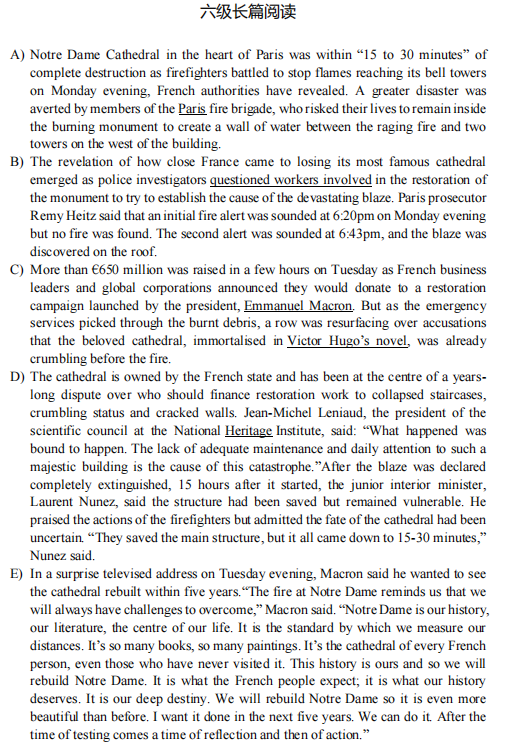
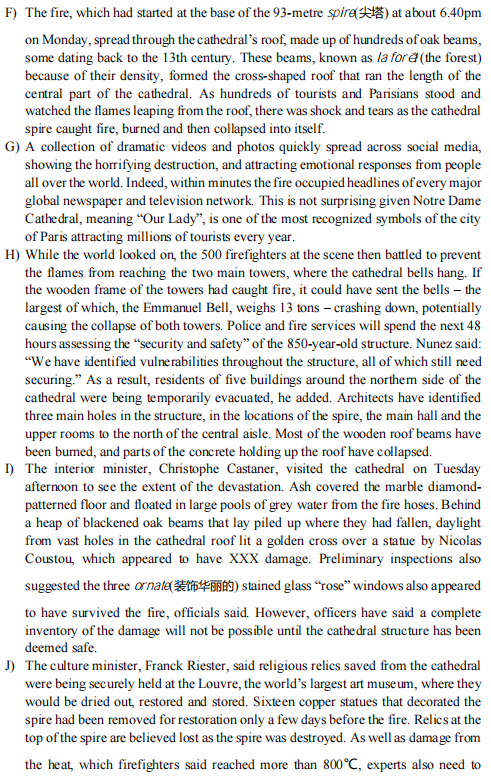
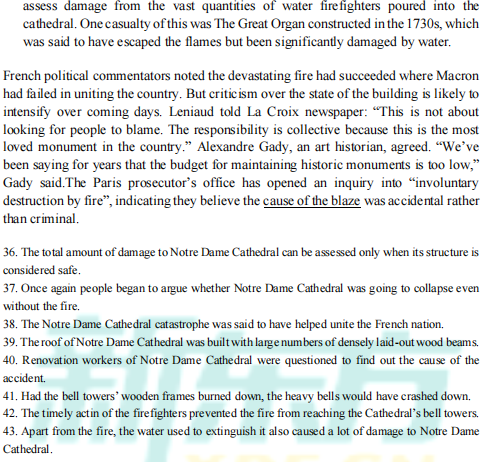
仔细阅读1:
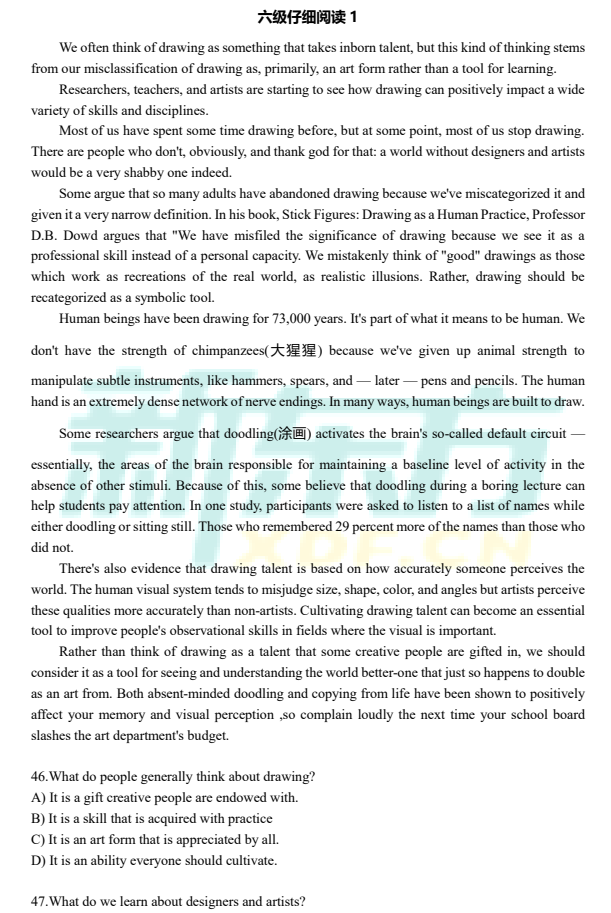

仔细阅读2:
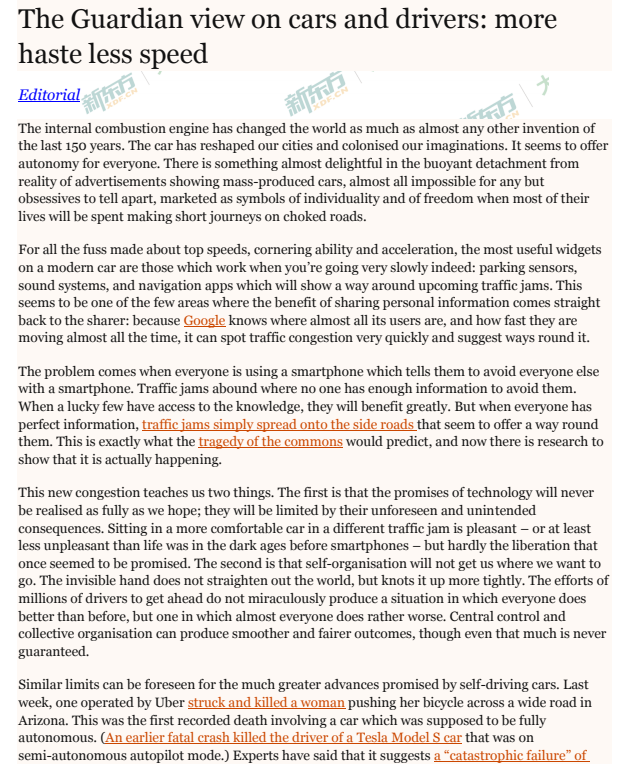

翻译第一套:
青海是中国西北部的一个省份,平均海拔3千米以上,大部分地区为高山和高原。青海省得名于全国最大的咸水湖青海湖。青海湖被誉为“中国最美的湖泊”,是最受欢迎的旅游景点之一,也是摄影师和艺术家的天堂。青海山川壮丽,地大物博。石油和天然气储量丰富,省内许多城市的经济在石油和天然气工业带动下得到了长足发展。青海尤以水资源丰富而闻名,是中国三大河流长江、黄河和澜沧江的发源地,在中国的水生态中发挥着重要作用。
翻译第二套:
云南是位于中国西南的一个省,平均海拔1500米。云南历史悠久,风景秀丽,气候宜人。云南生态环境优越,生物多种多样,被誉为野生动植物的天堂。云南还有多种矿藏和充足的水资源,为全省经济的可持续发展提供了有利条件。 云南居住着25个少数民族,他们大多有自己的语言习俗和宗教。云南独特的自然景色和丰富的民族文化使其成为中国最受欢迎的旅游目的地之一,每年都吸引着大批国内外游客前往观光旅游。
翻译第三套:
海南是仅次于台湾的中国第二大岛,是位于中国最南端的省份。海南岛风景秀丽,气候宜人,阳光充足,生物多样,温泉密布,海水清澈,大部分海滩几乎全年都是游泳和日光浴的理想场所,因而被誉为中国的四季花园和度假胜地,每年都吸引了大批中外游客。海南1988年建省以来,旅游业、服务业、高新技术产业飞速发展,是中国唯一的省级经济特区。在中央政府和全国人民的大力支持下,海南将建成中国最大的自由贸易试验区。
相关推荐:
2021年6月英语四级考试答案 | 2021年6月大学英语六级考试答案
·2021年6月大学英语六级考试答案(完整版) (2021-6-12 22:25:21)
·2021年6月大学英语六级翻译真题:青海 (2021-6-12 21:47:17)
·2021年6月大学英语六级翻译真题:云南 (2021-6-12 21:47:01)
·2021年6月大学英语六级翻译真题:海南 (2021-6-12 21:46:47)
·2021年6月大学英语六级作文题目:高等教育 (2021-6-12 21:08:01)
·免费真题 ·模考试题


- 1
- 2
- 3
- 4
- 5
- 6
| 北京 | 天津 | 上海 | 江苏 | 山东 |
| 安徽 | 浙江 | 江西 | 福建 | 深圳 |
| 广东 | 河北 | 湖南 | 广西 | 河南 |
| 海南 | 湖北 | 四川 | 重庆 | 云南 |
| 贵州 | 西藏 | 新疆 | 陕西 | 山西 |
| 宁夏 | 甘肃 | 青海 | 辽宁 | 吉林 |
| 黑龙江 | 内蒙古 |
实用文档 | 入党资料 | 入党申请书 | 入党志愿书 | 个人自传 | 转正申请书 | 思想汇报 | 个人简历 | 简历模板 | 简历封面 | 工作计划 | 工作总结 | 自我评测
个性评测 | 社交评测 | 事业评测 | 运势评测 | 报告 | 实习报告 | 工作总结 | 社会实践 | 心得体会 | 述职报告 | 调查报告 | 辞职报告
法律文书 | 合同范本 | 演讲范文 | 更多>>
英语学习 | 听力口语 | 阅读写作 | 翻译文化 | 趣味英语 | 学习方法 | 英文经典歌曲 | 每日课堂 | 空中英语 | 少儿英语 | 影视英语 | 英文歌曲 | 更多>>
作文大全 | 作文 | 小学 | 初中 | 高中 | 话题作文 | 考研 | 四六级 趣味作文 | 体裁作文 | 记叙文 | 议论文 说明文 | 应用文 | 读后感 | 作文素材 | 名言警句
优美段落 | 哲理故事 | 诗词赏析 | 成语知识 | 技巧 | 写作指导 | 作文点评 | 佳文赏析 | 写作基础 | 话题演练 | 作文教学 | 更多>>


